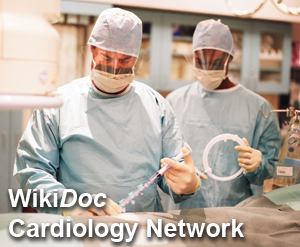Antiangiogenic
| Cardiology Network |
 Discuss Antiangiogenic further in the WikiDoc Cardiology Network |
| Adult Congenital |
|---|
| Biomarkers |
| Cardiac Rehabilitation |
| Congestive Heart Failure |
| CT Angiography |
| Echocardiography |
| Electrophysiology |
| Cardiology General |
| Genetics |
| Health Economics |
| Hypertension |
| Interventional Cardiology |
| MRI |
| Nuclear Cardiology |
| Peripheral Arterial Disease |
| Prevention |
| Public Policy |
| Pulmonary Embolism |
| Stable Angina |
| Valvular Heart Disease |
| Vascular Medicine |
Template:WikiDoc Cardiology News Editor-In-Chief: C. Michael Gibson, M.S., M.D. [1]
Antiangiogenic refers to a chemical or biological agent that inhibits or greatly reduces formation of new blood vessels (angiogenesis).
These agents are sometimes used to combat cancer by starving tumors of the blood needed to grow and spread.
The pharmaceutical thalidomide is such an antiangiogenic agent.
When pregnant women take an antiangiogenic agent, the developing fetus will not form blood vessels properly and thereby stop the proper development of fetal limbs and circulatory systems. The results of the late 1950s and early 1960s when pregnant women were given the drug were children with tiny flippers for arms and legs.
External Link(s)
- http://www.google.com/search?q=thalidomide+cancer New blood vessel inhibitors
- http://www.google.com/search?q=antiangiogenic+cancer New blood vessel inhibitors